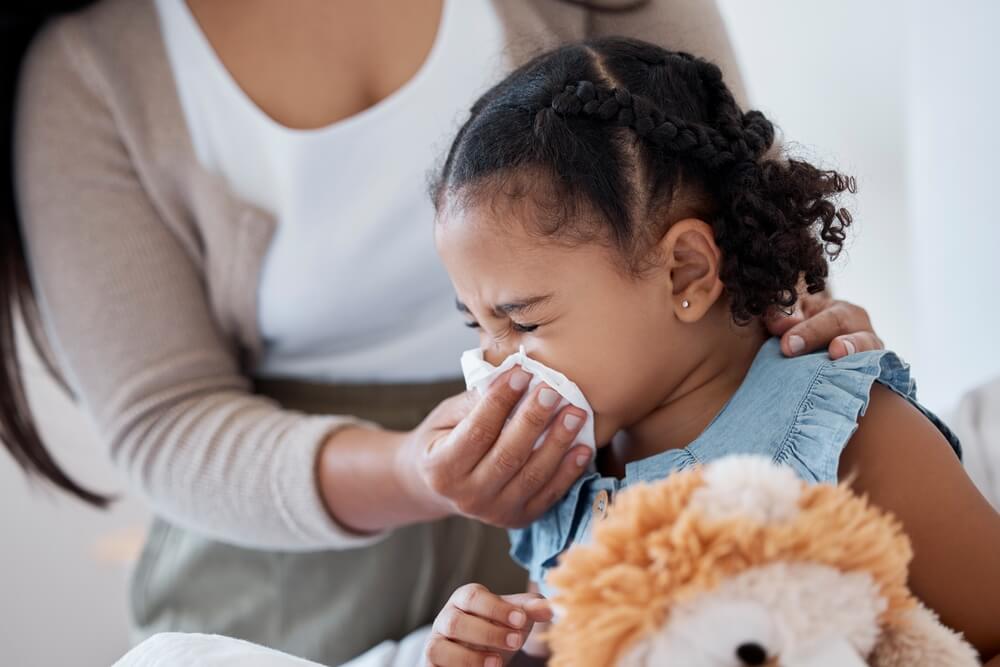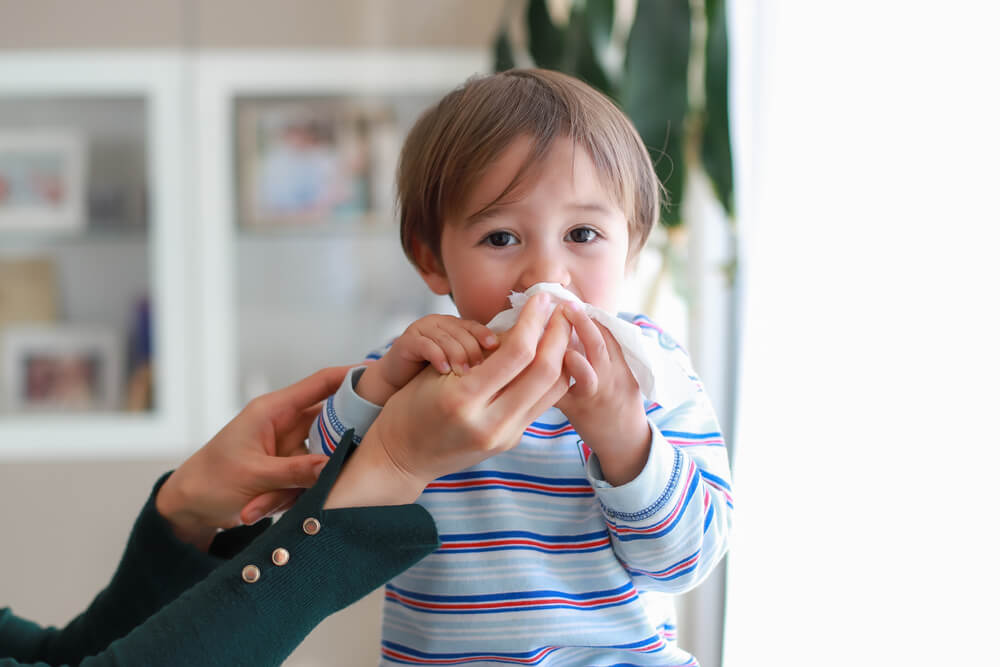Why Does My Toddler Always Have a Runny Nose?
A runny nose in a toddler may mean a variety of things. Sometimes, it’s nothing more than a simple cold; in other cases, a runny nose in kids may signal allergies. In other cases, a runny nose may indicate a sinus infection. Still, if you are concerned about the problem and wonder how to stop a runny nose in toddlers, this article may help in understanding the main reasons behind a runny nose and how to remedy the issue.
Also, if you still have any concerns about the topic after reading this article, feel free to reach out to the expert team at the Children’s Medical Center of South Florida.
Runny Nose in Kids: Main Reasons

Allergies
Scientific research shows that approximately 40% of all children between six and 19 years of age are sensitive to at least one allergen that leads to a reaction, and inflammation inside the nose will be among the most prevalent symptoms.
Typically, this allergy sensitivity is referred to as hay fever or allergic rhinitis. Hay fever is usually caused by the immune system’s overactive response to something in the child’s environment (dust mites, mold spores, pollen, pet dander, etc.) that they breathed in.
The immune system tries to clear out and fight off these inhaled things from the environment, often leading to different allergy symptoms such as watery eyes, sneezing, runny nose, itching, and red skin as a result. If the problems worsen, children may also develop coughing, headaches, and a sore throat.
How to stop a runny nose in a toddler in the case of allergies? For the most part, seasonal allergies are harmless, and trying to steer the child clear of the allergens can help greatly. Vitamin C and decongestants may also help in other cases.
Common Cold
Toddlers may come down with a cold around six to eight times a year, and having a runny nose is one of the typical symptoms of the problem. In the case of a cold, the runny nose is caused by viral infections in the throat and the nose. And even though it’s very annoying, having a runny nose during a cold serves a clear purpose: The increased mucus production aims to eliminate the virus from the body.
In some cases, it’s easy to confuse a cold with allergies. Parents may tell the difference between the two simply by observing the child. If the symptoms get better within ten days, then chances are, it was only a cold. If the symptoms linger longer or even seem to come and go, allergic reactions may be the culprit behind your toddler’s runny nose.
A Deviated Septum
A deviated septum occurs when the bone and cartilage that partition the nasal cavity (referred to as the septum) are displaced, leading to the narrowing of one of the nasal passages. This misalignment of the septum can disrupt the proper drainage of mucus from the sinuses, potentially resulting in persistent symptoms like a runny nose or postnasal drip.
Deviated septums can be present from birth, while others develop the condition due to accidents or injuries. Although treatment for a deviated septum is seldom necessary, some children experiencing severe symptoms may find relief through septoplasty—a surgical procedure to reshape or repair the septum.
Sinusitis
A runny nose in kids might also develop as a result of sinusitis. The sinuses can be best defined as the hollow spaces around the eyes, forehead, and nose. These sinuses may become inflamed as a result of allergies or a cold and may produce more mucus, and if the said mucus can’t get drained efficiently, it may block the sinuses.
If germs and bacteria are trapped inside the blocked sinuses, a sinus infection or sinusitis may develop, which will also usually cause a fever and other symptoms such as headaches and green nasal discharge.
Use children’s Tylenol or Advil instead of aspirin to alleviate the pain. The latter isn’t entirely safe for children due to an increased risk of developing Reye’s syndrome, which is a rare disease causing liver and brain swelling.
Respiratory Tract Infections
Viral respiratory tract infections, such as influenza (commonly known as the flu), can also result in a runny nose, particularly in younger children. Although this occurrence is less frequent with the flu compared to the common cold, it serves the same purpose—a means for the body to expel the virus.
Additional indicators of a viral respiratory infection encompass nasal congestion, coughing, and a scratchy throat. These infections are transmitted when children come into contact with the nasal secretions of an infected individual and subsequently touch their eyes, nose, or mouth. Therefore, emphasizing practices like thorough handwashing and promoting good hygiene habits is essential for preventing the transmission of these viruses.
Treating a Runny Nose in Toddlers

How to stop a runny nose in a toddler? In the case of viral infections, getting rid of the runny nose may be a challenge, as viruses may spread through a drippy nose, coughs, and sneezes, and it can be hard to prevent a preschooler from touching their mouth and face.
Still, the best way to stop a runny nose in a toddler would be to target the underlying cause, no matter whether it’s an infection or allergies. On that note, here are some of the most prevalent treatment options for stopping a runny nose:
Nasal Irrigation Systems
These systems ease allergy and cold symptoms with the help of saline, which moistens the passages in the nose, flushing out congested sinuses.
Decongestants
These can be great for older children, as they shouldn’t be given to children under the age of four. Still, to be on the safe side, you should consult with your child’s pediatrician before opting for these treatments.
Antihistamines
Allergy symptoms may be handled with antihistamine meds. These block histamine, the compound the human body releases when triggered by an allergen. While generally considered safe from age six and older, parents are always encouraged to talk to their child’s pediatrician about antihistamines to ensure total safety for their kids.
Corticosteroids
Corticosteroid sprays can alleviate allergy symptoms, inflammation, and nonallergenic rhinitis. Still, it’s highly recommended that parents read the labels on these compounds as recommended ages will vary depending on the product. Some of them are good for children aged two and up, while others are recommended for ages six and older.
Learn More
There can be multiple underlying factors contributing to your child’s nasal discharge. Various prevalent conditions may lead to a runny nose. It’s crucial to consult your pediatrician, as they are the most qualified to assess your child’s condition and formulate an appropriate treatment strategy. Always discuss with a medical professional regarding your child’s symptoms before initiating any new treatment for a runny nose.


